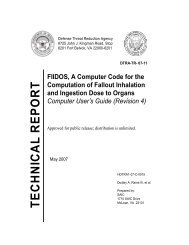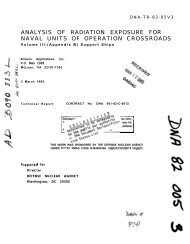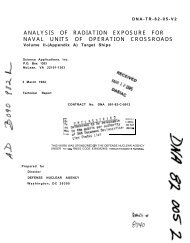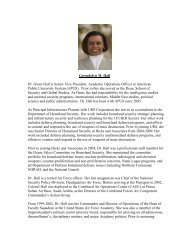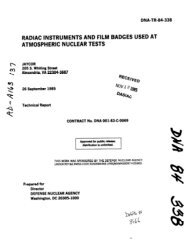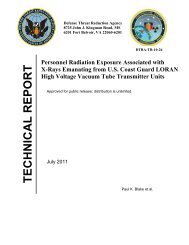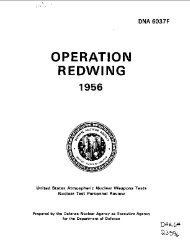Shield - Defense Threat Reduction Agency
Shield - Defense Threat Reduction Agency
Shield - Defense Threat Reduction Agency
You also want an ePaper? Increase the reach of your titles
YUMPU automatically turns print PDFs into web optimized ePapers that Google loves.
(page 10) African weapons storage facility – 2010. (above) SALW Technical Advisor Ben Cacioppo assesses an ammunition storage site in Central America – 2010. (right) Senior Technical<br />
Officer Bill Johnson assess an ammunition storage area in southeast Asia – 2010.<br />
must gain the trust and respect of the host country to allow them to<br />
enter the country and assess their weapons and munitions.<br />
“We can’t just come in and say ‘We want to look at all your stockpiles<br />
and possibly destroy some of them’ because they don’t always<br />
understand why,” says Wise. “So we go into their country in a cooperative<br />
manner and tell them that we know they are the true experts<br />
of what they need for their own defense purposes. We explain that<br />
we just want to make sure that whatever they have is being secured<br />
properly, but that’s not always easy to do.”<br />
DTRA approached Tanzania through the U.S. embassy in 2008 to<br />
offer an assessment of the facility which had long been identified<br />
as a concern. Tanzania did not take advantage of the opportunity.<br />
The following year, an ammunition explosion at the facility killed<br />
26 people, injured hundreds more and destroyed over 7,000 homes.<br />
DTRA offered to help the country secure the facility. Tanzania declined.<br />
Two years later, an army munitions bunker housing aging<br />
ammo exploded in the Mbagala district of Tanzania, near the international<br />
airport. The event killed at least 20 people and wounded<br />
more than 100.<br />
“Unfortunately, this happens,” says SALW AFRICOM Desk Officer<br />
Chanda Brown. “We offer our assistance to countries and they<br />
12 / the shield / fall 2011<br />
don’t take it. They have so many other factors for instability – coups,<br />
changes in leadership and natural disasters – that they don’t always<br />
see us as a priority. But when they do agree to schedule a meeting<br />
with us and they don’t cancel… when they listen to what we can<br />
do for them and seem to want to make a difference… when they<br />
actually work to make tangible improvements themselves or follow<br />
up with the State Department for assistance… that’s what I view as<br />
a success.”<br />
In March, a SALW team deployed to the Democratic Republic of<br />
the Congo (DRC) was preparing to conduct a seminar at a base<br />
attached to the DRC presidential palace. Sixty armed rebels subsequently<br />
stormed the compound in a violent attempt to assassinate<br />
the president of the DRC. After a hail of gunfire that killed numerous<br />
soldiers and rebels, the compound was closed for investigation<br />
and the SALW team was forced to relocate the seminar.<br />
“We were teaching our seminar to the participants from the base<br />
that was attacked,” says SALW AFRICOM Technical Advisor Ben<br />
Cacioppo. “With everything that had just happened, it was difficult<br />
to get their mindset back onto some of the things we were talking<br />
about… but we talked about the tragedy and what could have prevented<br />
it to refocus them on why we were there.”



